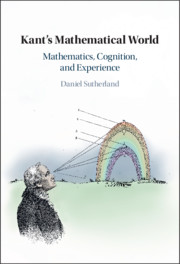Book contents
- Kant’s Mathematical World
- Kant’s Mathematical World
- Copyright page
- Dedication
- Contents
- Preface and Acknowledgments
- 1 Introduction
- Part I Mathematics, Magnitudes, and the Conditions of Experience
- 2 Space, Time, and Mathematics in the Critique of Pure Reason
- 3 Magnitudes, Mathematics, and Experience in the Axioms of Intuition
- 4 Extensive and Intensive Magnitudes and Continuity
- 5 Conceptual and Intuitive Representation
- Interlude The Greek Mathematical Tradition as Background to Kant
- Part II Kant’s Theory of Magnitudes, Intuition, and Measurement
- Bibliography
- Index
5 - Conceptual and Intuitive Representation
Singularity, Continuity, and Concreteness
from Part I - Mathematics, Magnitudes, and the Conditions of Experience
Published online by Cambridge University Press: 21 October 2021
- Kant’s Mathematical World
- Kant’s Mathematical World
- Copyright page
- Dedication
- Contents
- Preface and Acknowledgments
- 1 Introduction
- Part I Mathematics, Magnitudes, and the Conditions of Experience
- 2 Space, Time, and Mathematics in the Critique of Pure Reason
- 3 Magnitudes, Mathematics, and Experience in the Axioms of Intuition
- 4 Extensive and Intensive Magnitudes and Continuity
- 5 Conceptual and Intuitive Representation
- Interlude The Greek Mathematical Tradition as Background to Kant
- Part II Kant’s Theory of Magnitudes, Intuition, and Measurement
- Bibliography
- Index
Summary
The previous chapter argued that intuition allows us to indeterminately represent a continuous manifold of space. On the other hand, this possibility appears to be inconsistent with Kant’s characterization of intuitions. He contrasts them to concepts by stating that the former are singular and immediate representations. Singularity seems to commit Kant to the view that, by its nature, intuition must represent an individual object, and many have understood him in this way. That would directly contradict the previous chapter. Chapter 5 addresses this problem. It argues against a quick solution to this problem and for a deeper account. Examining the generality of concepts suggests a distinction between representing and represented, and the singularity of intuition is explained as a mode of representing singularly. The chapter argues that representing singularly is compatible with the indeterminate representation of a continuous manifold; moreover, it is what makes possible the cognition of singulars in intuition. This new reading of the singularity of intuition solves the extensive magnitude regress and also has important implications for understanding mathematical cognition as well as the current Kantian nonconceptualist debate. It also allows us to give a clear account of Kant’s views of concreteness and abstractness.
Keywords
- Type
- Chapter
- Information
- Kant's Mathematical WorldMathematics, Cognition, and Experience, pp. 121 - 160Publisher: Cambridge University PressPrint publication year: 2021



